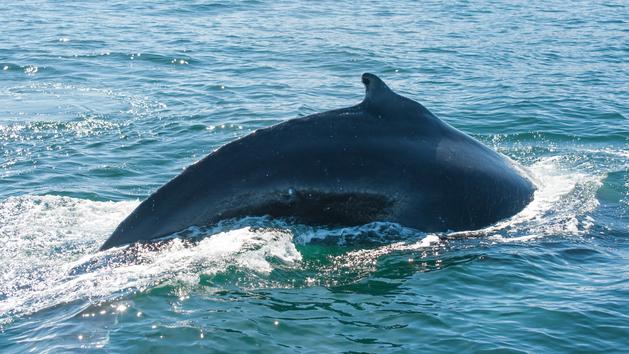" She is in a terrible state of thinness ": WWF drew attention on Friday July 24 to the "agony" in the Mediterranean of a whale cut off its tail, symbol for the NGO of the impact of human activities on cetaceans.
Read also: Lemurs, right whales, hamsters ... 32,000 endangered species
This fin whale called Fluker has been known for years by experts at the Pelagos marine sanctuary, a protected area created between Italy, France and Monaco. He was indeed already recognizable by his half-amputated caudal fin (" fluke " in English). But for less than a year, the whale has lost the rest of its tail, probably after " a collision with a ship or an entanglement in a net ", according to the Pelagos sanctuary.
The cetacean seen several times in the area in recent weeks, to the point that authorities have called on boaters not to approach it, was filmed by a WWF team aboard its Blue Panda boat. " She is in a terrible state of thinness, we felt that she was having difficulty moving, " Arnaud Gauffier, director of the NGO's programs, told AFP.
Second largest animal in the world
The fin whale, the second largest animal in the world after the blue whale, uses its tail to propel itself and mainly feeds on krill (small shrimp) by filtering the water when it swims. Today, Fluker “ can dive and eat but much more difficult than normal, which explains his thinness, ” said Arnaud Gauffier.
Read also: How the heart of a whale beats
At the end of June, the Pelagos sanctuary had already confirmed the presence of the whale, which seemed " emaciated " and presented " many parasites ". At that time “ Fluker managed to move around (about 100 km per day), to dive and to eat, although with difficulty. This individual, who surprised the scientific community for his adaptability, however had a very low chance of survival , ”the sanctuary told AFP on Thursday. " At this time, any update and speculation about his state of health would seem premature, " he added.
Establishment of a " particularly vulnerable maritime zone "
In any case, " what is especially shocking is the fact that human activities have been able to put it in this state ", insisted Arnaud Gauffier, who calls for the establishment of a " particularly vulnerable maritime zone »In the north-western Mediterranean, very busy.
This would allow in particular to limit the speed of the ships, and thus the risk of fatal collision with cetaceans, while 10 to 40 fin whales are killed each year in this way in the Pelagos sanctuary, according to WWF, which also pleads for the deployment of anti-collision systems and the establishment of policies to combat " ghost " fishing nets .




/cloudfront-eu-central-1.images.arcpublishing.com/prisa/PH7553GPABDL5BZOBP775AC5E4.jpg)






